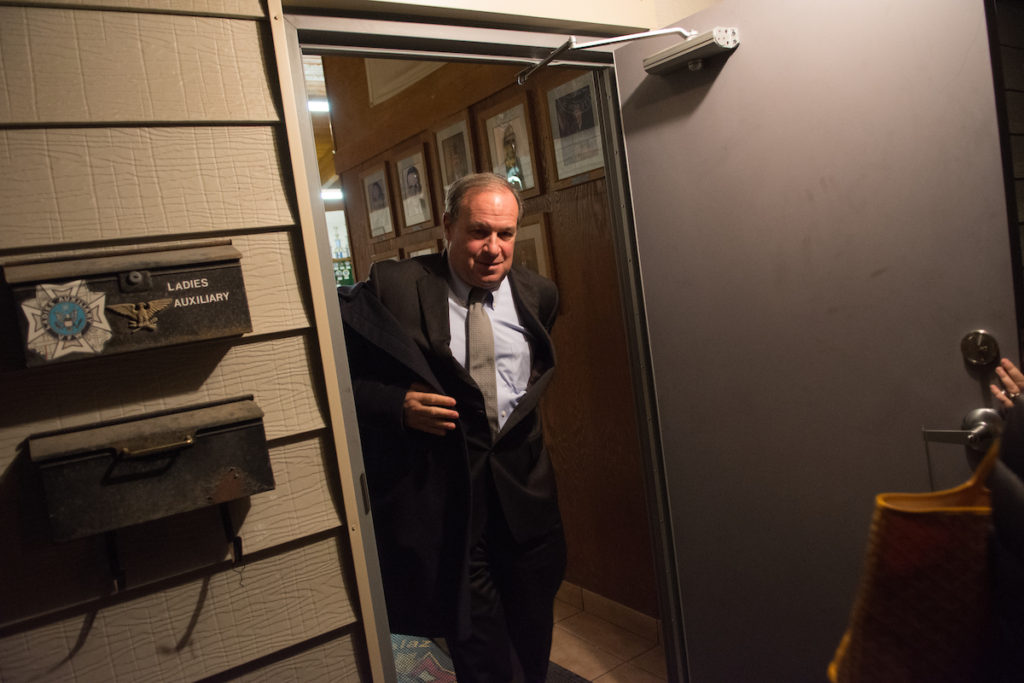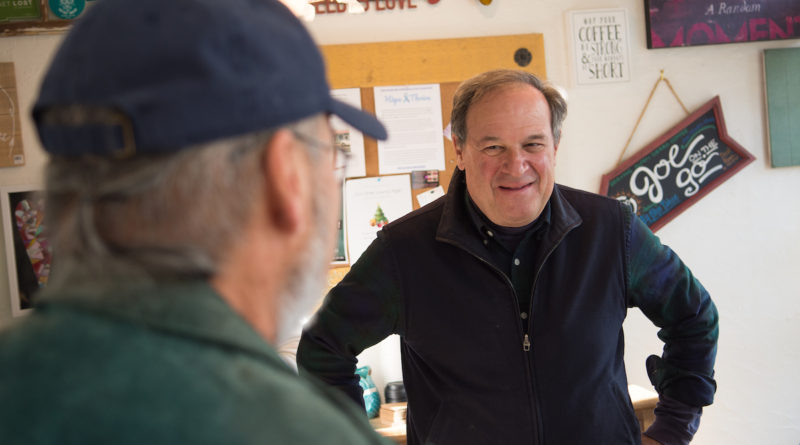‘I campaign in prose’: On the trail with Republican gubernatorial candidate Dan Schwartz
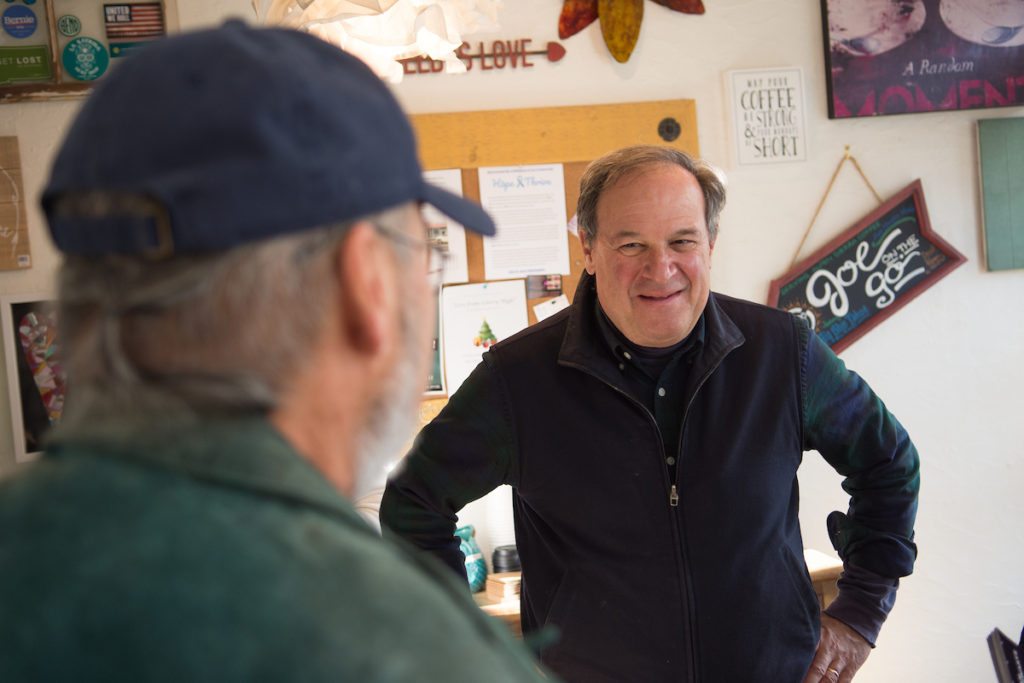
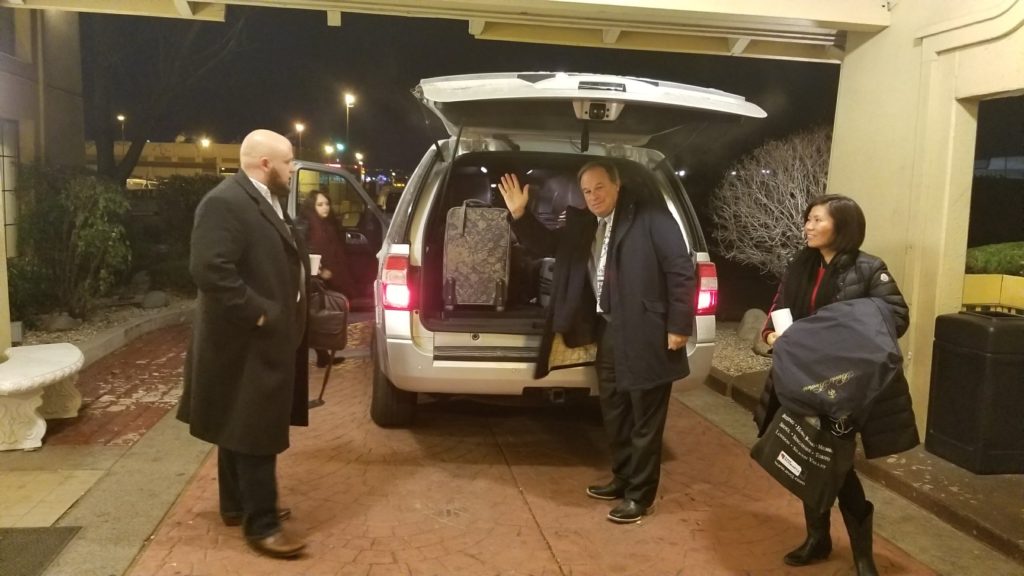
By Michelle Rindels
https://thenevadaindependent.com
It’s 6 a.m. and still dark when a silver Ford Expedition pulls into the porte cochere of a La Quinta in Reno, a cloud of fog trailing bright in the 21-degree December chill.
Treasurer Dan Schwartz jumps out from behind the steering wheel, wearing a wool coat and what appear to be brand new cowboy boots, to help load the suitcases of two staffers and a reporter. It’s the beginning of a Nevada gubernatorial candidate rite of passage — a tour through the rurals. Republican country.
Although about 90 percent of Nevada’s population lives in Clark and Washoe counties, the 10 percent who live in small rural counties can play a decisive role. Republican Attorney General Adam Laxalt, Schwartz’s primary foe who scored a razor thin victory over Secretary of State Ross Miller in 2014, did so in spite of losing Clark and Washoe because he won so handily in the 15 other counties.
Schwartz has traveled these roads before, as a candidate for treasurer before he won the statewide office 2014. But he’s now on a tougher — and some would say quixotic — quest: snatching the Republican primary race from the hands of anointed candidate Laxalt, a younger, more guarded, more ideologically pure contender who’s outraised him five times over.
Even Schwartz’s family and friends, who are offering up financial support for a campaign he proudly says is not funded by any lobbyist or corporate cash, question why he’s doing it and how he can win. Part of it is that his heart’s not in sitting in the treasurer’s chair for another four years. Part of it is a profound self-assurance that he can do things better than they’re being done now.
“I think they’re aware of the circumstances. They’re going, ‘How are you going to beat Laxalt?’” Schwartz said. “I say we’re going to beat him. Partly he’s going to beat himself. But we have a plan. I think we can win it. And I think we will.”
He jumped in after a poll he commissioned over the summer showed him just a few points behind Laxalt in a Republican primary. The path to closing the gap, as his campaign sees it, involves pouncing on any of Laxalt’s mistakes and sealing the deal with a strong field operation. It also involves a little bit of chutzpah, the kind Schwartz uses to describe his own business success when he bought into a publication called the Asian Venture Capital Journal in Hong Kong.
“My definition of an entrepreneur is if someone knew then what they knew now, they wouldn’t do it,” he said. “You had to be somewhat crazy to do it and obviously it worked out.”
Schwartz steps back into the driver’s seat and pulls the SUV into gear. As it starts rolling forward, a staffer in the back seat yells out, “Dan! Dan!”
The back hatch is still wide open. Schwartz forgot to close it, narrowly avoiding sending the stacked luggage falling.
Schwartz gets back out, latches it shut, and once again pulls out into the dark pre-dawn.
However inauspiciously, the Schwartz campaign is off to the races.
***

Sunrise is brilliant over the hills of Lyon County. The highway curves in parallel with white cattle fences, and steam billowing from smokestacks is stark against the cold sky.
Schwartz’s wife, Yanan, is bundled in a black puffy coat in the passenger seat. She checks blind spots before her husband changes lanes and takes the lid off one of the two hotel coffees in the console, offering him a drink.
A multilingual China native who had her own globetrotting career helping the Italian government implement environmental and development projects in her home country, Yanan married Schwartz in 2011 after friends set them up. She’s a supportive and engaged presence on the trail, avoiding public remarks but greeting attendees at events with a broad smile, taking in their concerns and offering her observations later about the peculiarities of each rural community.
Even with a reporter in tow, Schwartz doesn’t shy from potential pitfalls in choosing conversation topics for the drive. First up — lightning-rod Alabama Senate candidate Roy Moore, whose special election was scheduled that day. Schwartz wanted analysis from his campaign manager, Rory McShane, about how the race would turn out.
(Asked his opinion after results came in that night and Moore lost, Schwartz seems unconvinced that it’s an omen for Nevada Republicans: “Alabama — a vote against a pedophile, which is why [Doug] Jones won. So personally I don’t draw any huge conclusions other than that local politics, local conditions matter.”)
Second up as a conversation topic — guns and the Route 91 Harvest festival in Las Vegas, site of the deadliest mass shooting in modern American history. Schwartz is pensive, lamenting that mass killings are happening with ever greater frequency and intensity.
“It seems like there’s no way to prevent it, unless you somehow get guns off the street. There’s just no pattern to this,” he said. “You can’t control the media, you can’t control who drives a truck, you can control who buys a gun, but that doesn’t seem to work.”
He does fault Gov. Brian Sandoval and his opponent, Laxalt, for the fact that Nevada has not implemented an expanded background check requirement even after voters narrowly approved the measure. The will of the people has been thwarted, Schwartz argues, in the same way it was with the Commerce Tax: Republicans in the 2015 Legislature helped pass the levy on large businesses even though voters had overwhelmingly rejected a different business tax on the ballot in 2014.
“You have individuals deciding to make up the law, or to do or not do what the voters want, and I personally have a problem with that,” he said. “I’m sure there would’ve been a way to do [background checks] if Laxalt had wanted to do it.”
His gun stance is the perfect example of Schwartz’s willingness to take on a Republican orthodoxy, and his seeming disregard for creating alliances that might help his cause. Laxalt and Sandoval have a frosty relationship — not least because of Laxalt’s stated intention of unraveling the Commerce Tax — but Schwartz has opted to publicly call out both rather than exploiting their tension to get one of them in his corner.
He calls Laxalt an “empty suit” who’s beholden to special interests, and demanded on a radio show that he resign his post and drop out of the race. He countered Sandoval’s meticulously researched 2015 budget proposal with a three-page “alternative budget,” then was publicly skewered in an elaborate show hearing meant to lay bare the alternative budget’s deficiencies.
In his 2012 congressional bid and 2014 treasurer run, Schwartz says he was guided more closely by consultants. While he has staff guiding him along the 2018 tour, they generally let him say what’s on his mind, and at great length.
“This time I said ‘OK, I’m going to run the race that I want to run,’” Schwartz said. “I’m going to not do business with people I don’t want to do business with. And that may be the Legislature, it may be Gov. Sandoval, it may be Sheldon Adelson (a major Laxalt donor), it may be others. I’m not going to do business with them because that’s not the state I want to create.”
“If elected, I’m going to be the governor I want to be, and I think it’s going to benefit this state and I think it’s going to benefit the people of this state,” he added.
***

Schwartz said he hadn’t been very engaged in the school choice movement until a bill was passed in 2015 to create Education Savings Accounts (ESAs). Lawmakers tasked his office with managing the program, which allows parents to redirect public school funding to private school tuition and other qualified education expenses.
“The more I thought about it, the more I liked it,” he said.
Schwartz and his team zealously embraced the cause, rolling out applications on an aggressive timeline and defending IT infrastructure to implement it in front of sometimes hostile lawmakers. He and Laxalt were allies in fighting for ESAs in a court battle that ultimately determined the program was legal, but the funding mechanism was not.
He’s frustrated that funding fell through in the 2017 session and has gone so far as to commit to signing no other bills as governor until the Legislature sends him a satisfactory ESA bill.
“There are some excellent public schools and there are some excellent teachers, but they are far and few between,” he said. “There are many parents who are dissatisfied with the cultures, the social cultures, of many public schools. They don’t like drugs, they don’t like cliques, they don’t like their kids being bullied and the private schools have considerably less tolerance for this kind of behavior.”
But he also acknowledges ESAs are not the silver bullet for a problem he frequently brings up in public meetings and on the campaign trail — that Nevada’s education system continues to rank at or near the bottom in spite of much publicized interventions in the last few years. One of his first acts as governor, he said, would be to call for hearings so he can assess the issues.
“I don’t know all the problems in public schools,” he said. “I went to school in a different time and place. I was challenged. I had great teachers. We all wanted to go out with the cheerleaders, we all wanted to run track, but those are the normal adolescent [concerns]. We all worried, ‘Is my shirt cool? Or should I wear penny loafers or wingtips?’ And I just think the problems are far greater now.”
Schwartz is a product of public schools in suburban Chicago. One of three children, his father ran hotels and his mother, trained as a nurse, ran telephone switchboards for her husband’s business.
He’s the grandson of a Hungarian immigrant who became a rabbi. He attended Sunday School and Hebrew School at his grandfather’s congregation, and describes summers spent at camp, time on the track team, Cub Scouts and student government. To this day he attends synagogue at Temple Beth Shalom in Las Vegas.
Schwartz went on to Princeton — the last cohort before the school started admitting women — and earned a law degree and a business degree before making millions in international business. His brother, likewise, is living comfortably after running a successful hotel management company.
If he doesn’t win, Schwartz thinks he’ll be just fine.
“We ride into the sunset,” he said. “I love my wife, we have a funny dog … we have a nice house, I’m a happy guy. We have some money in the bank. So if I don’t win, I don’t win.”
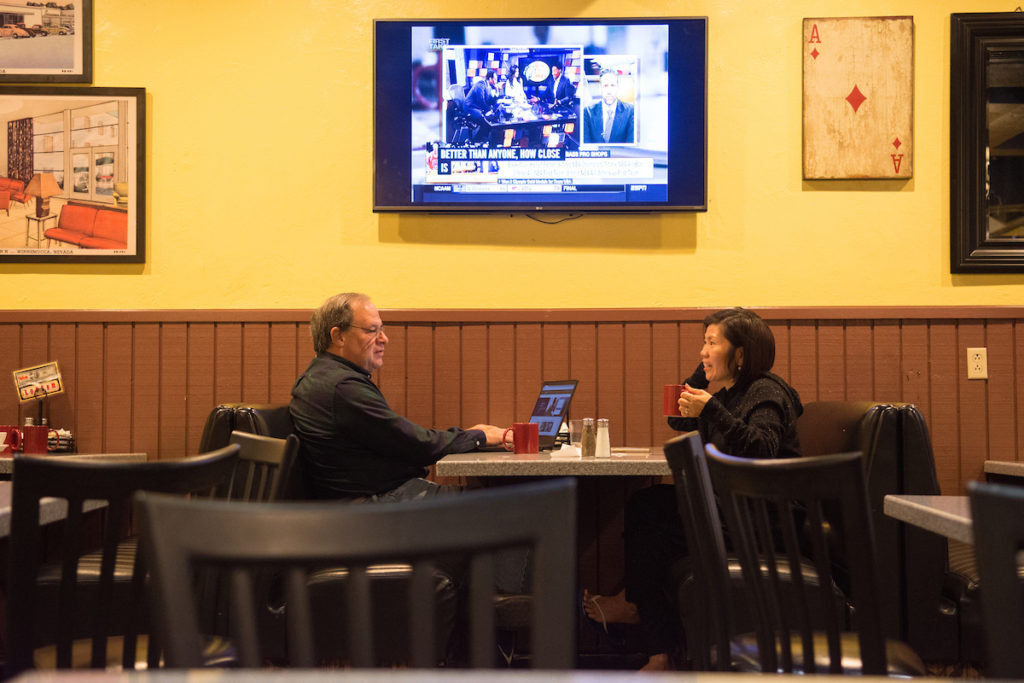
The Fernley Ambassadors are a lively group, made up of everyone from yoga teachers in their 30s to real estate agents, financial planners and retirees in their 70s. About 50 people attended a breakfast meeting to hear Schwartz and participate in a raffle where prizes included large bottles of hard liquor.
Schwartz, fueled by coffee, a link of sausage and a cellophane-wrapped pastry from the breakfast buffet, circles the room and listens to attendees talk about the issues in their city of nearly 20,000. A bedroom community with a median home price that’s about $100,000 less than in Reno, Fernley is growing fast, but infrastructure and services aren’t keeping up. There’s also tension between the city and officials in the Lyon County seat of Yerington, which is an hour away.
When it’s time to take the stage, Schwartz asks what attendees most want to hear about. The answer comes almost in unison — the C-tax.
Schwartz immediately launches into a discussion about the Commerce Tax. He calls himself the first to oppose the measure when it emerged in 2015, although he’s not taken up the same crusade to repeal it that some of his fellow constitutional officers have taken.
The crowd listens politely for a few minutes until the chamber’s leader gently intervenes. C-tax is not a nickname for the new Commerce Tax on larger businesses, he says, but actually a revenue stream called the consolidated tax, which combines revenue from the sales tax, liquor, cigarette, vehicle registration and real estate transfer taxes.
The C-tax is distributed to municipalities and other local government bodies based on a complex formula. But because Fernley was only incorporated as a city in 2001, and the Legislature created the distribution model in 1997, it was excluded.
Despite the city’s lobbying efforts, pleas to lawmakers and a battle in the Nevada Supreme Court, Fernley still hasn’t been grafted into the formula and isn’t receiving the tax money it feels it’s due. The city is the only one to incorporate in Nevada since the C-tax became law, and it received $133,050 in C-tax revenues in 2013 while Elko — almost the same size — received $7.3 million.
As a result, the community is served by the Lyon County Sheriff’s Department when it would prefer to have a local police force, and residents say they’re not confident they’ll get a timely response when they need one. It’s a chicken-and-egg problem: the high court determined Fernley isn’t owed much C-tax because it is relying on Lyon County for services, but it struggles to create services without the C-tax.
Schwartz takes in their arguments over the unique conundrum. By the end of the speech, he makes a cautious promise to the people of Fernley.
“What I will do on election night, watch the returns. If I win, you come to me with a budget, say ‘OK Dan, we need this amount of money,’” he said. “I’m always nervous about making promises and pledges but I can promise you I will take that budget, and I will do what I can to make sure you get the money you feel you deserve.”
***

Denny and Angela Berry worked for Walmart for decades before they decided to strike out on their own.
“We just decided to do something for us,” Denny, 51, said in an interview after the Fernley Ambassadors meeting let out.
So they poured their life savings — $300,000 — into buying two Fitness for $10 gyms. They’re part of a chain of large, low-cost fitness centers.
They doubled the membership at the Fallon location in the first year. And the Fernley location? Denny said they had entered a vacuum, where the only other option was a gym three times the price, and it’s been hugely successful.
But the Berrys, who have lived in Fernley for 12 years, still have concerns they hope a governor can help with. They feel that without a city police force — a result of the C-tax matter — that officers wouldn’t be able to respond to their business in time to stop a crime if it occurred. Their grandkids attend local schools that are getting ever more crowded.
And recently, they lost their health insurance, which would have cost them $2,000 a month to cover both. They were finally able to find a plan on the state health exchange — Sandoval negotiated with insurer Centene to cover rural counties such as Lyon that otherwise would have had no coverage through the exchange — but aren’t sure how good the insurance will be.
Schwartz was the first candidate they’d seen come speak to their group. They haven’t decided who they’ll vote for but they said they’re looking for someone who can make a difference.
“His speech doesn’t sound super polished … it sounds more real, versus someone who’s so polished in their speeches that you don’t even know what they’re saying because it’s puppy dogs and unicorns and pixie dust,” Denny said. “I’d rather have somebody speak to me real.”
***

After a drive to Fallon, a city about an hour away with a population of about 9,000, and checking into a budget motel, Schwartz is ready to film an episode of “Dan Does Jobs,” in which he visits a business and is assigned tasks by the management.
It’s a trick employed in the past by former Senate candidate Joe Heck, whose stints included serving lunch to customers at Red’s 395 Grill in Carson City, and Rep. Ruben Kihuen, who donned a UPS uniform and delivered packages for a few hours. So far this cycle, Schwartz has tried his hand manning the front counter at the bustling Reno Coffeebar and repairing the carburetor on a 1961 Corvette.
The whole encounter — dad jokes, mistaken names and all — is broadcast on Facebook Live. McShane is quick to point out the contrasts with Laxalt, who granted only limited, brief interviews during his announcement tour in November and deflects questions on topics such as Medicaid.
“The last election with Donald Trump demonstrates that transparency matters, that the genuine article matters,” McShane said. “We Facebook Live everything, because we’re not afraid of ‘oh, what if Dan says one wrong word and is not on a poll-tested message.’”
At Louie’s Ace Hardware store in Fallon, Schwartz dons a slightly too small red vest and instructs the staff to put him to work.
His first task is to sort metal handles for cupboards into their proper shelves; his second is to help the rentals staff tune up a rototiller for spring. Finally, he’s told to hoist 20-pound bags of wild bird seed off of pallets and onto a Tetris-style formation at the front of the store.
“We’re going to have a whole lot of happy birds in Fallon come spring,” he says as the stack of feed grows to waist-high.
Schwartz, whose background is finance and who considers himself first and foremost a businessmen, seems most at home talking with a manager about how they finance their inventory and how many times it turns over each year.
He meets the purchasing staff in the store’s back room, where he’s introduced as — potentially — Nevada’s next governor. He pulls out his familiar, self-deprecating line.
“If this governor gig doesn’t work out, I can come work for you,” he said.
The manager explains that the nearby Fallon Naval Air Station, which supports thousands of direct and indirect jobs in Fallon, is a major customer for the hardware store. Along with farming, activity at the base is what keeps the town humming.
Locals say they enjoy the life that the Navy personnel bring, although it put Schwartz at an inconvenience when the campaign team stopped at Jerry’s Restaurant, an old-timey diner in the heart of town.
Schwartz had polished off a loaded salad for lunch but jumped at the offer of dessert, asking for a milkshake. The waitress came back a few minutes later, reporting apologetically that the restaurant was clean out — the large detachment of servicemembers newly arrived in town for training had wiped out their entire ice cream supply.
***
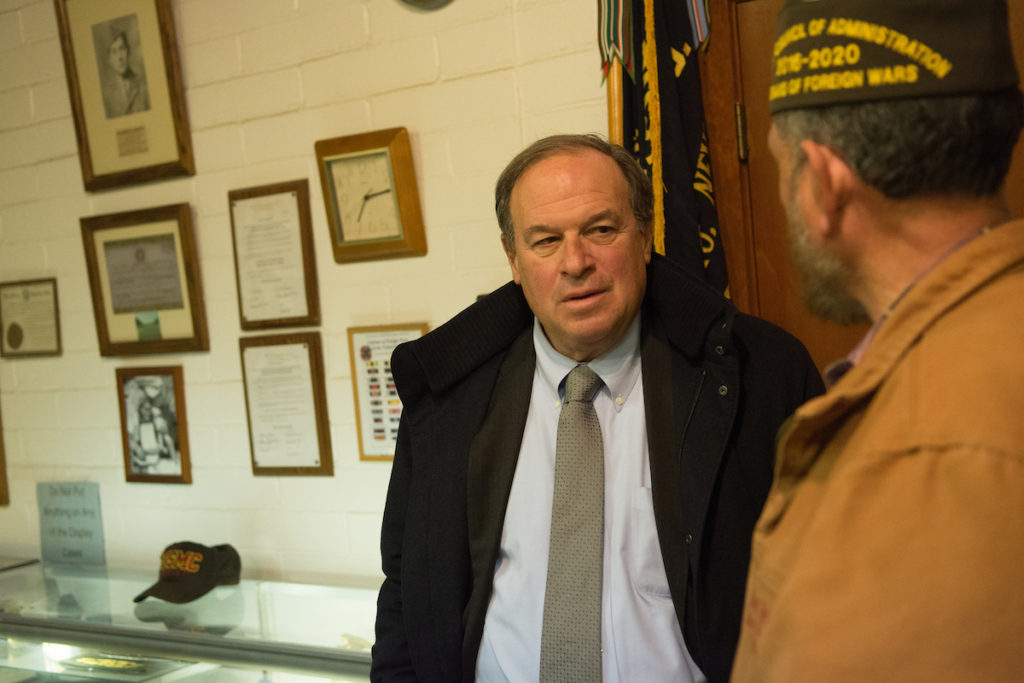
Schwartz is a veteran, but he takes a very different approach to it than his primary opponent.
Laxalt has made his Navy service a cornerstone of his campaign, describing himself as part of a generation of Iraq War-era veterans eager to jump into political service after leaving active duty. His Twitter account is filled with links to heartwarming stories about charities that help veterans, pictures of him meeting veterans, highlights of his attorney general initiatives focused on “military heroes.” One campaign event in December was centered around the Army-Navy football game; another scheduled this week is centered around an undisclosed “special announcement” about veterans.
Schwartz, who lists “veteran” below “businessman” and “conservative” on posters he hangs up at his campaign events, offers a less-than-gauzy picture of the military.
“There were good things and there were bad things,” he said. “Adam talks like it’s the second coming.”
Schwartz had gone to college when he was called up in the draft; his number was 88, and the draft ended after 95. He could’ve gone to Vietnam, but instead was sent to Geilenkirchen, Germany, a NATO air base close to the Dutch border.
The objective was to man Pershing missiles that could help ward off a potential missile strike from the U.S.S.R., and the ostensibly high tech assignment was given to a unit of all college grads. But like the others in his unit, he quickly grew disillusioned — the clunky system would have taken half a day to boot up, he said, and the Russians could have sent a missile to them in five minutes.
“I think I can say this without being sanctimonious — all of us at that time could’ve not served and all of us felt for any number of reasons that we owed this to our country,” he said. “Having said that, we all said, ‘What a waste. What are we doing here?’”
Schwartz describes the Army as full of characters — some who had been told by a judge that they could serve a jail sentence or enlist — and suffering the fatigue of a long, unpopular war. Soldiers who had wrapped up a tour in Vietnam but needed to serve their last years were sent to Germany; many had drug problems. Alcohol was abundant, provided at half price and sometimes re-sold at a markup to the German soldiers stationed alongside them at the base.
He said some of the higher officers were “J.V.,” and can hardly contain giggles as he tells one war story of one lieutenant he had nicknamed “Jimmy Snack Bar.”
The officer carried around a briefcase, but his secret was out once someone caught a glimpse of what was actually inside — a stash of comic books and candy bars.
Schwartz says he thinks the Republican Party has perhaps beatified the military to the point that it can’t recognize its excesses. Or, he says, perhaps it’s a way to delineate us versus them.
“There are a lot of Republican credos and that’s one of them,” he said. “And what it is is a symbol of something else, and maybe it’s a symbol that the Democrats are all smoking weed and getting juice cures and whatnot.”
He points out that U.S. military spending is several times more than the second biggest-spender — China. And he points out that there’s a $2-$3 trillion in unmet infrastructure needs domestically. Schwartz, for example, wants to see a high-speed train built between Reno and Las Vegas.
“Until the leadership of this country takes a real hard look at what are the real needs — what do we need to defend ourselves … I think we’re going to continue to spend money on things that we don’t need,” he said. “That money can be redeployed in the domestic economy.”
***

Night had fallen in Fallon and the bar at the American Legion Post 16 was buzzing, but the hardwood-floored room next door was a bit more sparse. Only a half-dozen people had shown up to the post’s Tuesday night meeting, which was to feature Schwartz. It wasn’t enough to meet quorum.
But the post’s leaders stayed true to the ceremony. After a color guard offered up a crisp presentation of the colors, the young commander led the group in the pledge of allegiance, and the group recited the Legion’s oath and bowed their heads for an invocation. An empty chair was placed at the front of the room to honor comrades killed or missing in action.
Schwartz was invited to speak in his capacity as treasurer; Legion officials were enforcing a strict no-partisanship policy. On the ride over, his staff had briefed him about the format and encouraged him to talk as much as he could about his own experience as a veteran.
His unscripted talk touched on his time in the Army, referring to attendees at times as brothers and sisters. But it also betrayed his mixed emotions about the military.
“I tell people we fought the battle of the Hofbrauhaus,” he quips about his service in Germany, to laughter. “I tell people the Army is a cast of millions at a cost of billions.”
Schwartz lays out his accomplishments in his esoteric role as state treasurer: increasing the investment returns for the state, speeding up the unclaimed property processing times and advocating for ESAs. He lays out bullet points of his vision for the governorship, which is heavy on economic issues: state officials won’t head overseas for trade missions, for example, but they’ll set up offices in California to get companies to move in.
During Schwartz’s speech, a man seated at the board’s table and wearing a shirt screen-printed with a wolf had his head down. When it came time for questions and answers, he perked up — he wanted to know what’s Schwartz’s plan for dealing with problems at the border.
Schwartz tried to pivot from the question. Although border security is important, he said, the real travesty was how Nevada was paying too much to get companies to cross the border and set up shop here.
The treasurer has been the highest-ranking critic of the Governor’s Office of Economic Development, a Sandoval creation that has brokered major deals including one to bring electric carmaker Tesla’s massive battery factory to Northern Nevada. Schwartz asserts that his vocal resistance to issuing bonds as part of a Legislature-approved incentive package for auto startup Faraday Future is what saved Nevada taxpayers from losing money in a factory project that never came to pass.
GOED disputes that it ever asked Schwartz to issue bonds. The matter came to a head — but no consensus — at a meeting last week over a Schwartz-requested audit exploring whether GOED thoroughly vets the finances of companies it tries to lure. Opposition to abatement packages remains a central theme in the Schwartz campaign.
But the redirect doesn’t satisfy the man, who is clearly more interested in immigration.
“We need to take care of Nevada first. Yes, we are a border state down there, kinda, sorta. To let the immigrants come in — it’s wrong,” he said. “It’s wrong that we let all these people come into the state and we give them what they want. We give them free food, we give them free education, we give them everything.”
Schwartz eventually responds that it’s a federal question better answered by congressional representatives Dean Heller and Mark Amodei.
And then there were questions about what he would do for veterans — why isn’t Northern Nevada home to a national veterans cemetery? It’s only got a state cemetery right now. Again, Schwartz said, that’s a question for Amodei and Heller.
The decorum devolved a bit, as the handful of Legion members and Schwartz go back and forth in a free-wheeling exchange about issues that have varying degrees of relevance to the governor’s race. Finally, one Legion member calls out a question above the other voices.
“I have a very very simple question. Are you going to be accessible?” the man asked.
The treasurer is ready on this one.
“There are a couple people running in this race OK? One is totally inaccessible. I’ve put out my cell phone publicly. Call it, OK? How’s that?” Schwartz said, adding “don’t bug me.”
That gets an enthusiastic response from the group, including one Legion member who jokes he’ll call once a week.
“That’s the absolute perfect answer that I wanted to hear,” the man said.
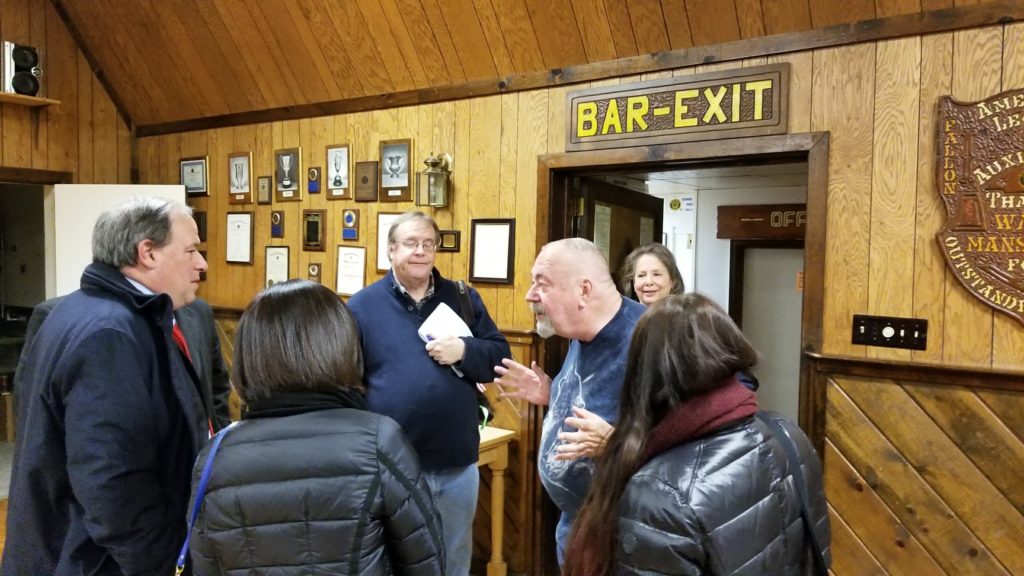
Kris Ann Adauto is the post’s financial officer and an Air Force veteran who helped evacuate GIs from Vietnam to Germany. A flight nurse, she was the only woman in a unit of 250 men when she served.
Now retired from nursing, her biggest concern is that it’s hard to get VA medical services in Fallon. She says she has to travel to Reno when she needs certain services, and has trouble getting to Reno because of her health condition.
She wants more local hospitals to bill the VA for services, but says she hasn’t been satisfied by the responses she’s getting from the congressional delegation.
“Evasive. That will sum it up,” she said about her representatives in an interview after the Post meeting, while Schwartz talks with a reporter from the Lahontan Valley News and fellow Legion members play darts a few feet away.
She wants a governor who will serve the people and the veterans, she said. And she’s already decided she’ll vote for Schwartz, saying she was “kind of excited” to come to the meeting that night and meet him.
“That’s what I was impressed with,” she said about his background in finance. “We need someone that’s more economically inclined to understand what people are going through.”
She does think he can improve by being “more people-oriented and less political.” But she likes him more than the other three major candidates in the race.
“He seems more genuine. His persona, his approach to people,” she said. “He’s very approachable.”
***
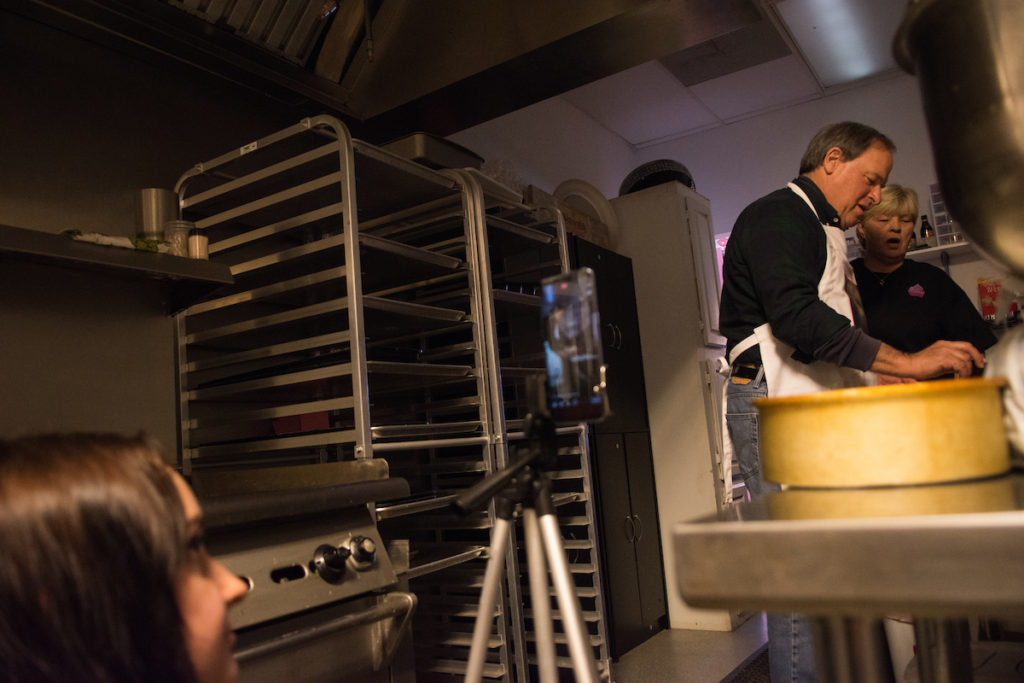
It’s a cold and sunny Wednesday afternoon when the SUV pulls up to Tutu’s Toppers, a small bakery in a Winnemucca strip mall where Schwartz will make chocolate cupcakes for his last “Dan Does Jobs” segment of the tour. It’s decorated in pink tulle and Christmas lights, and a cutout of Elsa from the movie “Frozen” is standing up near the counter.
The backstory of the whimsical little bakery is too hard for owner Joy Sanders to tell, so she delegates the task to her son, Justin.
With the cellphone camera rolling, Justin lays out a heartbreaking story about his niece, Haley Joy Gibson. Four years ago, the 4-year-old girl was diagnosed with diffuse intrinsic pontine glioma, an aggressive brain tumor with a survivability rate of less than 10 percent.
The family learned of her diagnosis on a Wednesday. By Thursday, she had died.
The bakery is a tribute to Haley, adorned with the same curtains and decorations that were in her bedroom, and a portion of the proceeds go to help childhood cancer research and St. Jude Children’s Research Hospital. The little girl loved cupcakes and had a penchant for wearing tutus with jeans and Crocs.
“Haley kind of marched to the beat of her own drum,” Justin said. “She was in her own little world most of the time.”
Schwartz, wearing a white apron with a sepia-toned portrait of the cherubic, curly-headed Haley, transitions perhaps a little too abruptly into the rest of the segment.
“Thanks Justin, that’s a great story and it’s a great Nevada story too,” Schwartz said. “We’re all thrilled to be here. Let’s do a little baking.”
Joy has already prepared a mixture of coffee and buttermilk, and tasks Schwartz with mixing in four eggs. He tells the audience that this is definitely something he can do — his wife taught him how to crack eggs because they mix half an egg into the breakfast food of their Chow Chow dog named Bao (that’s the Chinese word for “treasure,” Yanan says; not to be confused with “treasurer,” the treasurer clarifies).
The cupcakes are a recipe passed down through Sanders’ Italian family, apparently a product of Depression-era ingenuity — coffee deepens the flavor of the cocoa, she explains. Sanders’ family was all born and raised in New York; she came out to Nevada for school and stayed after meeting her husband, who works as a miner.
Schwartz scoops dollops of rich brown batter into a baking pan under Sanders’ watchful eye, tossing out jokes along the way. Halfway through the task, he announces that the creations should be named “The Governor’s Cupcake.”
“If I can invest $3 billion, I can do the cupcakes right?” he says.
Sanders swaps out some pre-baked cupcakes for Schwartz to frost, and then lets him sample one of the finished products. They’re so decadent that he ends up with chocolate on his face.
Schwartz leaves with a pink box of a dozen cupcakes. He reflects later about the ups and downs of a campaign.
“The best part, and I say this without trying to overly glamorize it, is the people you meet,” he said.

***
Events on Laxalt’s announcement tour were opened by big names in Nevada politics, such as Lt. Gov. Mark Hutchison. But there’s nobody to share a glowing introduction on the Schwartz rural tour; he’s butted heads with most of the establishment at one point or another.
“I don’t think we’ll get any high-profile endorsements. Truthfully, I don’t know if I want them,” he says over lunch at a Winnemucca cafe. “I want to get rid of them all. They know that.”
As much as he’s critical of Sandoval, he acknowledges that his job isn’t easy.
“I told Yanan, what’s scary is if I actually win,” he said. “It’s a big responsibility. Being honest. Being able to say no to people … making the right decisions.”
There’s an old saying that candidates campaign in poetry and govern in prose as they realize the things they promised can’t be accomplished. The ever-blunt Schwartz eschews the idea.
“I campaign in prose and I govern in prose,” he said. “I don’t know poetry.”
